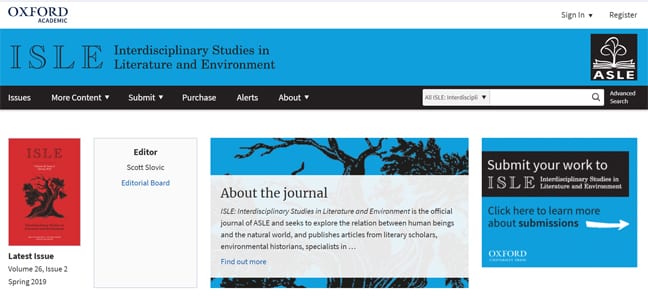By Elizabeth Dodd, ASLE Mentoring Co-Coordinator, University Distinguished Professor, Kansas State University, and Sara Kearns, Academic Services Librarian, Kansas State University
Although the field of environmental humanities is flourishing intellectually, academic publishing faces increasing financial threats. Many of us in US colleges and universities have watched our libraries cancel periodical subscriptions as cost-cutting efforts. While certain scholarly journals, owned by private, for-profit companies, charge exorbitant subscription costs, lower-cost journals in the humanities often are included in both targeted and across-the-board cuts, despite the modest subscription rate they charge.
ISLE: Interdisciplinary Studies in Literature and Environment is the official journal published by ASLE, with the first issue in 1993. Since 2009 it has appeared quarterly, offering scholarly articles, book reviews, and creative work in both print and online format. Happily, ASLE members can take action to help support ISLE and other journals we value.
- You can reach out proactively to the acquisition librarians at your institution, explaining how you rely on the journal for your teaching and research. Many institutions prioritize student needs above those of faculty scholars, so be sure to indicate specifically that you rely on the journal for your students’ coursework and research projects. Clarify what you value you in the journal, especially if that may not be the typical article view/download. If images, the layout, or back matter are important to your teaching and/or scholarship, explain that. It can make the difference between a direct subscription to the journal or accessing the journal through a database aggregator that prioritizes articles.
- You can boost the use metrics that libraries collect. Whenever you assign your students reading from a journal, avoid downloading a PDF for distribution. That mode of access tallies just a single use, even though the material will be read by many people. Instead, imbed the proxied, permanent URL for the article in whatever online learning platform your institution provides, so that each student’s access will be counted. When librarians review these statistics annually, a more accurate picture of the way you rely on ISLE will be reflected. The proxied URL lets the student sign in to access the article, whether or not they are on campus or signed in to a learning platform. Ask your librarian for information about creating the proxied, permanent URL.
- If your institution has a print subscription that you like to read or browse, do not re-shelve it. Instead, place the issue or bound volumes on whatever shelf, cart, or other system your library has established for materials to be re-shelved. These uses are often counted as “browses” and included in metrics measuring use.
- Collaborate with your librarian to increase use of the journal by your students. For instance, teach your students how to use the entire journal, not just to search for articles on a topic. Discuss: special issues; using book reviews to stay abreast of new developments, and how they are critiqued; and identifying trends the scholarship over time. Your librarian may have created, or be willing to create, research guides for a class or your discipline. A frequently asked question by students and new researchers is what are the key journals in a discipline? Working with your librarian to add these titles to the research guide can help students discover and use these important journals.
- Even though you have a personal login through the ASLE home page as part of your member benefits, you can choose to read it through your library’s portal, tallying those metrics for your personal scholarship as well as your teaching activities. Ask your librarian if BrowZine is available. Some libraries subscribe to BrowZine because it attempts to replicate browsing through a journal, online. (Results vary based on publisher.) You can create a bookshelf and get notifications when a new issue is released. You get an experience closer to print, and the libraries can collect metrics.
- Work with your colleagues and librarians to identify journals that can be cut instead of ISLE. Due to big package deals, many libraries now subscribe to journals their faculty and students do not need in order to access the journals they do need (think cable television packages.) More librarians are working to break up these big packages; knowing what they can cancel is valuable information.
- You can also help reduce the cost of producing paper paper copies by opting the electronic access only when you renew your annual membership.

